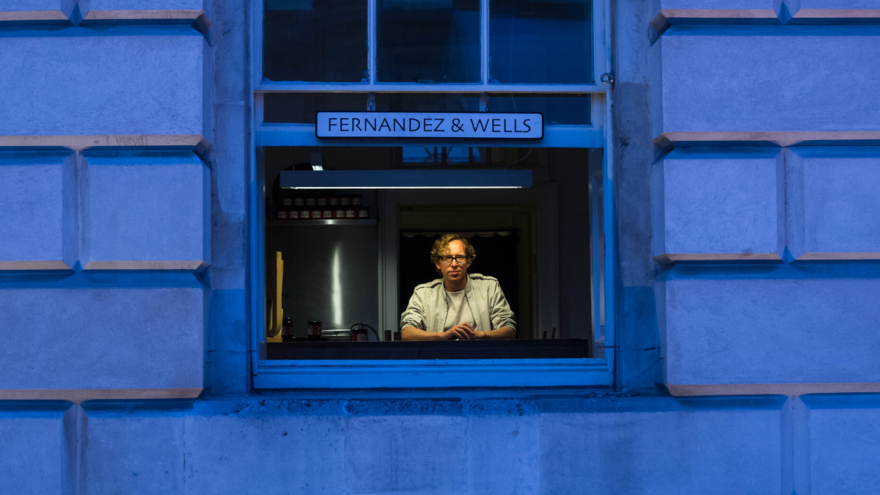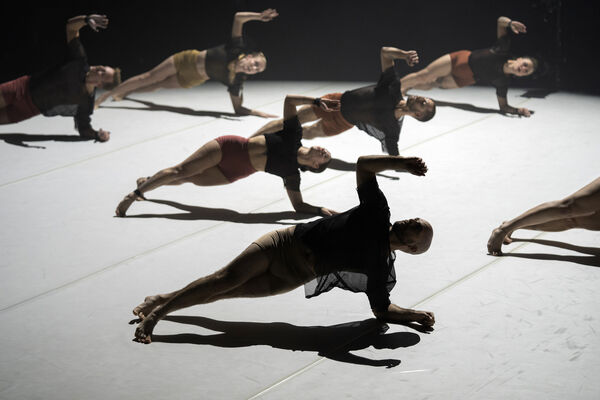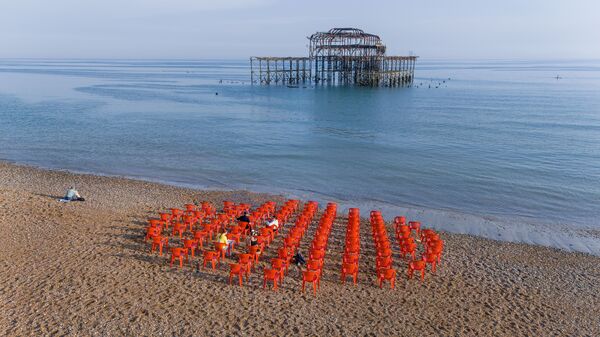
Interview with caravan showcase artist Andy Field
Andy Field is an artist, writer and curator and is one of the participating artists selected to take part in caravan, the biennial showcase of English performance as part of Brighton Festival. We spoke to him about how he’s adapted from creating a physical piece of theatre for an online audience.
Can you tell us about the show you were working on for caravan at the Festival?
We would have been presenting a show called ‘News News News’. We were working with a group of primary school children who become a local TV news crew. The idea is that they make short films about news subjects that matter to them. We then use the films to form part of a live theatre show and the audience get to see behind the scenes and there is a live news broadcast that the children have made from a tiny child size studio on stage.
What was your reaction when you realised the Festival was being cancelled and your show wouldn’t be happening?
We were pretty devastated. We love making this show and I was really excited to get to know the children. It’s always really exciting to be part of Brighton Festival as it’s so well known and full of interesting artists. In terms of the caravan showcase, a lot of what me and my partner, Beckie Darlington do relies heavily on working internationally to sustain ourselves. Caravan is an unparalleled chance of getting to meet people from around the world who might be interested in working with us. It isn’t simply about the money and the missed opportunity we’ve lost but also the future opportunities we were hoping might unfold as a consequence.
How important is a platform like caravan for emerging artists like yourself?
The kind of work we make and for a lot of the other artists in caravan, it’s all about the live encounter, what it means to actually be there. Presenting that work to a carefully curated group of international professionals, who might be interested in supporting you, that opportunity is really important.
It’s really interesting to see the amount of resourceful and ingenious digital work that is taking place, but we work in live performance for a reason, it’s because we cherish that act of gathering and the political and artistic potential in that. Without it you can feel a bit bereft.
Do you think the digital version of caravan will be useful for connecting with producers internationally?
Absolutely. The one thing that’s made us feel better about the loss of showing at Brighton Festival is how quickly, resourcefully and enthusiastically the curators of caravan have responded. The fact that they’ve tried to make the best of this situation and try to ensure that there’s still is an opportunity for those artists is really wonderful. I’m very grateful for them for putting the effort in to making this happen.
After the pandemic, I hope it will have a lasting impact in opening people’s eyes to new opportunities. Caravan have said to us there are people who would never have come to the live showcase because they were busy with other events or because they couldn’t afford the travel, who want to be a part of the digital version. It’s allowing us to connect with people who we wouldn’t have had the opportunity to if it wasn’t in a digital format.
As an artist how have you been coping with lockdown? Has it given you time to create new work or have you had to look at new ways to earn an income?
My partner and I have taken some of the ideas behind the show and turned it into a new project that children could do at home during lockdown.
We created the ‘News News News Reporters Club’, which is a free five-day activity pack that enables them to create their own DIY radio news show from their own home using just a pen, paper and a mobile phone. We provide an activity pack, some recordings to listen to and some news jingles to play with and children can make their own news show! Hopefully, it gives them an opportunity to do something creative and reflect on what’s happening in the world in a playful way.
Check out the News News News Reporters Club Activity Pack here
The response has been amazing. People have downloaded the pack from as far away as Australia, Brazil and China and then emailed it over to us. Just this morning we had a News show from a 6-year-old in Tasmania.
How have you been involved with caravan’s digital offer?
I’ve been asked to curate a series of podcasts to accompany the showcase that we’re calling Caravan Radio. One of the things you miss with the digital showcase is the opportunity to get to know each other as people. The aim of the podcasts is to provide a forum in which you can hear something a little more informal from the artists about their work and what they’ve been doing during this strange time. I’ve been curating and recording a series of conversations between caravan artists and interviews with different delegates all over the world.
The amazing thing about this pandemic is the fact that everyone in the world has been experiencing the same thing in different ways. Finding out how different people have been affected by this global crisis has been really interesting.
What are you hoping the new normal will look like?
From an artistic point of view, perhaps we wouldn’t take the value of social gathering for granted quite so much. The simple acts of human encounter that live performance is so good at, perhaps we would cherish that more having been starved of them for so long.
And is that what you’re looking forward to the most?
No, probably the kind of human encounter I’m looking forward to the most is just being able to sit in a pub garden in the sunshine and have a drink with my friends. Having a really good meal in a busy restaurant, simple things like that.
Find out more about Andy here
Read an interview with caravan Director Gavin Stride here
Interview by Liberty-Rose Gatcombe, University of Brighton, Multi-media Broadcast Journalism student placement: @liberty3rose



